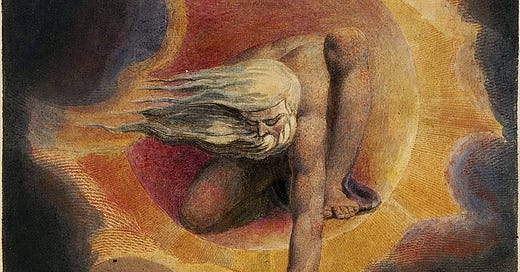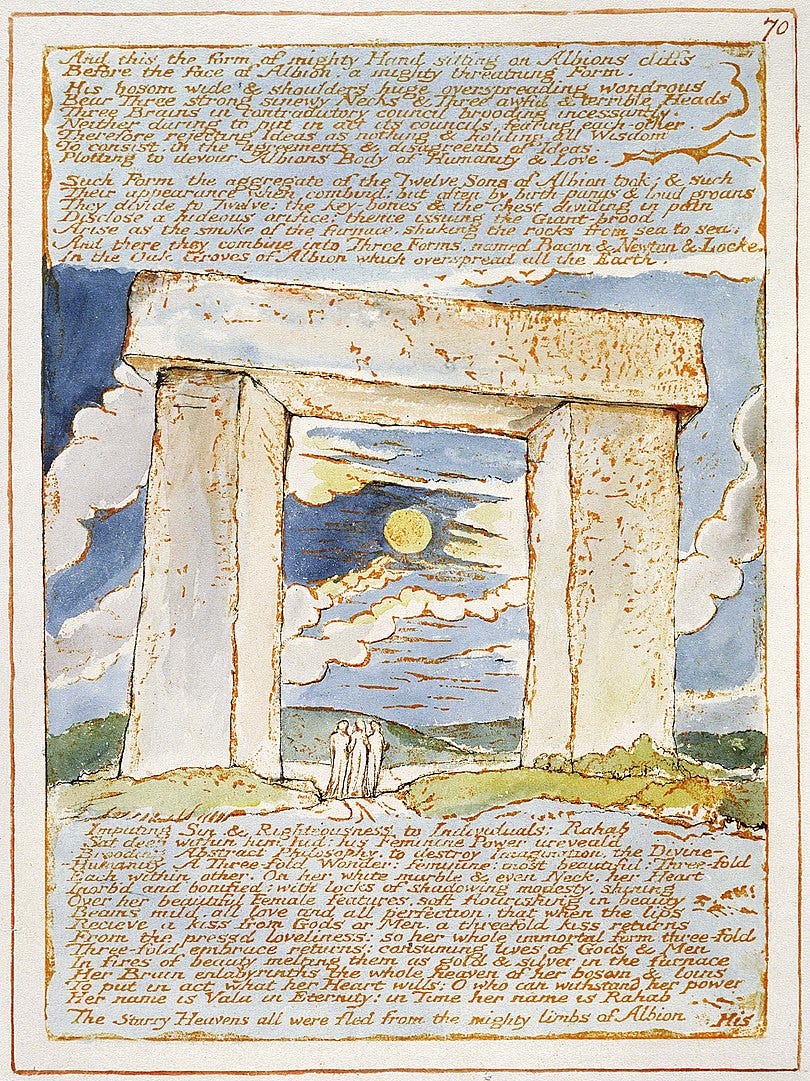William Blake Vs the World
"Reader! of books! of heaven, And of that God from whom who in mysterious Sinai awful cave, To Man the wond'rous art of writing gave."--William Blake
It is a favorite pastime of the darlings of our media: conjuring benevolent time travelers who abduct starving artists. Gleefully showing them how posterity has finally honored them. Schopenhauer sat smirking as he imagined a future that reveals himself to be a true philosopher and Hegel written off as a banana-turner. Yet even Schopenhauer—so sure of his incoming greatness—had his disciples scour and snip his name out of any newspapers that featured him.
And then there’s William Blake. Can you imagine his reaction to the existence of William Blake scholars? You mean people are getting paid to “think” about me? I who barely sold ten pieces of art during my entire life? Now literary scholars overreach by correcting Blake’s spelling and punctuation—the essence which made his work so raw and rebellious. Tenure kills punk rock.
To add to the delicious irony, Blake received little to no formal education. His childhood was spent romping the idyllic English countryside, his own personal Eden. England, to him, was Jerusalem—not because of what the eye could see, but because the eye could see. For Blake, God was not a bearded man on a throne in the sky but flowing imaginative poetic vision. Unchained and unbounded.
For such audacity, Blake was primarily branded a madman of the first rank. Begrudgingly, an artist or poet of the third or fourth. He lived in a time when the English were newly fixated on madness. Thanks to their King, George III, frothing in fits of mania while the symbol of orderly monarchy—the crown—sat on the head of a straight jacketed lunatic. The Vagrancy Act of 1714 didn’t help matters, allowing anyone deemed mad to be hauled off to Bedlam. A so-called hospital that was really just a human zoo. Bloodletting, opium, and humiliation were the cures of the day—and if you were in the mood for entertainment, you could buy a ticket to gawk at the lunatics.
This is the backdrop against which William Blake etched out his humble life. He used his gentle Lynchian disposition towards life as a shield, so the mad poet was never prosecuted. Yet he continued finding worlds in a grain of sand, angels in trees, and philosophical arguments with thistles. Despite the world not caring, he pressed on with his illuminated engravings and prophetic poetry, guided by his inner vision. It’s surreal to see his work now splashed across pages of The Guardian or dissected on BBC specials. Critics rave about the genius no one cared for when he was alive.
And now everyone wants to claim Blake for their own. There is the comparison to Emanuel Swedenborg, the Swedish scientist-turned mystic. Blake admired him as a living example of the renunciation of the rational Demiurge (Urizen) later in life. Yet Blake bristled at Swedenborg’s preference for heaven over hell.
The mind is its own place, and in it self
Can make a Heav’n of Hell, a Hell of Heav’n.
What matter where, if I be still the same,
And what I should be, all but less then he
Whom Thunder hath made greater?
Paradise Lost
John Milton
Blake knew that beauty lies in their opposites and in their eventual reconciliation. Is that Taoism? Blake had the same love for incompleteness, the same timeless quality of seeming to write poetry as if dictated from a subtler more ethereal plane. But unlike the Taoists, Blake believed in sin, in forgiveness, in Jesus Christ.
The problem with pinning Blake down is that he spent his whole life becoming himself. His imagination was boundless, loving not only the form but the act of creating itself. And if we love Blake, we should learn from him. It is not the form of the man we should love, but the realization that all are capable of becoming something new and uncharted beyond the maps of old.







A prophet is rarely well received in his own time and place. Blake was too far out for his but a lot of us now get him.
Sail on, adventurer
Beyond those maps of old.
Side note: "and if you were in the mood for entertainment, you could buy a ticket to gawk at the lunatics."
Tickets are free nowadays.